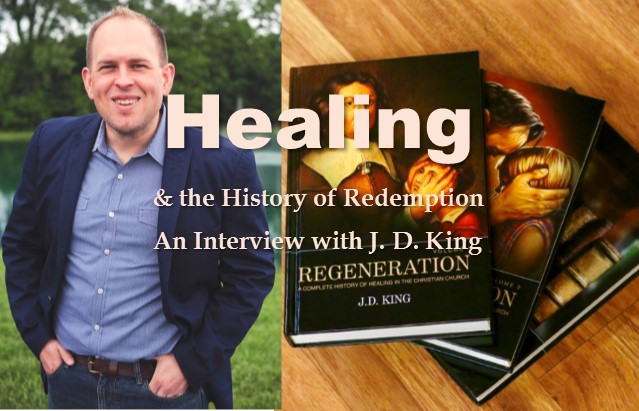| March 29, 2018 |
no comments

Pastor J. D. King speaks with PneumaReview.com about the history of divine healing he has written, the three-volume Regeneration: A Complete History of Healing in the Christian Church.
PneumaReview.com: Please tell our readers why you chose the name Regeneration for your book on healing.
J. D. King: I understand that some will accept this title and others will not. Through my studies, I have found that healing is deeply rooted in the gospel. The transformative work of Jesus is not just psychological, emotional, or spiritual—it is also physical. I know that it is controversial to make this assertion, but healing is truly part and parcel of the gospel.
While Craig Keener is by no means making the same argument, his monumental work, Miracles: The Credibility of the New Testament Accounts, highlights the viability of healing in Christianity. Jon Mark Ruthven, in his recent work, What’s Wrong With Protestant Theology, argues that healing and the works of the Spirit are what signify the reality of the “new covenant” (Isaiah 59:19-21). Missionary-evangelist, Randy Clark, has demonstrated healing’s significance in his vast Latin American crusades (as well as his recent interchanges with scholars at United Theological Seminary).[1]
Healing is a vital dimension of the regenerative work of Jesus.
My assertion that healing is rooted in the redemptive work of Jesus is historical as well as theological. Physical deliverance through the agency of Jesus has been demonstrated in virtually every Christian tradition. Contrary to conventional thought, waning does not occur after the fourth century. Healing was carried forward through the intercession of the monastics and well as missionary advancements.
[2] Later, medieval Christians were transformed through pilgrimages (sometimes even leaving crutches behind).
[3] Though the reformers tended to suppress healing, Martin Luther, nevertheless, prayed for Myconius
[4] and Melanchthon.
[5] In the early modern era, French and English monarchs prayed against scrofula—a devastating skin disease. The legitimacy of early Quakers, Moravians, and Methodists became confirmed through acts of healing. Prayer for the sick was also evident in the Pietist and Holiness traditions. Naturally, healing ultimately gained international prominence through Pentecostalism.
Healing has been a primary vehicle for church growth.
It is forgotten today that healing was as much of a characteristic of early Pentecostalism as tongues-speech. Frederick Dale Bruner writes that there was “an emphasis on healing in many Pentecostal circles, which makes it almost a second Pentecostal distinctive.”
[6] Keith Warrington acknowledged that among the early generations, the “emphasis on healing was never, and could never be, seen as secondary or a distraction from the evangelistic message. Since it was widely accepted that healing was provided for in the atonement, the offer of healing was part of the salvation message itself.”
[7] While Pentecostalism has veered away from this ethos, it is what informed the value system and missionary thrust of the founders.
Tags: featured, healing, history, interview, king, redemption
Category: Church History, Winter 2018



